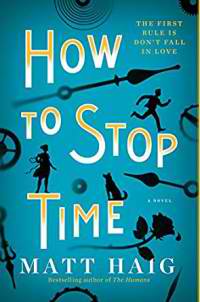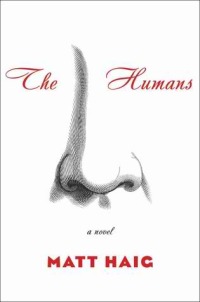How to Stop Time by Matt Haig
 Wednesday, February 14, 2018 at 9:07AM
Wednesday, February 14, 2018 at 9:07AM 
First published in Great Britain in 2017; published by Viking on February 6, 2018
How to Stop Time is a sneaky novel. It delivers an important message, but wraps it in such an engaging story that the message seems secondary until it begins to drive the story. The novel asks the reader to imagine living a very long life, and to think about whether the price required to stay safe is too great for the longevity it buys.
If you only age one year for every fifteen calendar years, maybe the secret is not to fall in love. Tom Hazard learned that the hard way. Tom was born in 1581. In his teens, having not visibly aged since the age of 13, his mother was accused of witchcraft. A few years later, he fell in love with a woman named Rose, but had to leave her (and their daughter) so that Rose would not be condemned for living with a boy who doesn’t look old enough to shave, but who never seems to age. Tom hasn’t been happy since.
Today Tom is a history teacher in London. He returned to London to search for his daughter Marian, who inherited the condition that slows aging. A fellow named Hendrich protects people with Tom’s condition by working to assure that their existence remains a secret. New people with the condition are discovered every year, just as people who might reveal their existence are killed every year. The killing is largely orchestrated by Hendrich, who values the lives of people with extended lifespans like his own over the ordinary people who might expose their existence.
Much of the story is set in 1599. Shakespeare enlivens the plot and adds the sort of wisdom about life that one expects from the Bard. During one of the 1599 chapters, a performing bear appears. Only the bear is not performing; it’s fighting to stay alive, despite being held in chains and tormented for the crowd’s amusement. In a book about longevity and its price, the bear becomes something of a metaphor for “the pointless will to survive,” no matter what cruelty and pain life has thrown in the bear’s direction. One of the serious questions raised by How to Stop Time is whether the quest for a longer life merely creates more opportunities for suffering and loss, whether the instinct for survival necessarily serves us well. Is life really so precious when suffering is the price for living?
One of Tom’s assignments for Hendrich leads to the novel’s tipping point, when Tom must decide whether longevity is more important than integrity and love and all the other things that make life worthwhile for people who live a normal lifespan, or less. The lessons that How to Stop Time teaches (primarily the importance of living in the moment, not in an unknowable future) are worthy if sometimes a bit obvious, and the story is entertaining despite its predictable resolution. Matt Haig’s fluid prose, solid characters, and convincing descriptions of historical settings all contribute to one of the better sf novels exploring the theme of longevity
RECOMMENDED
